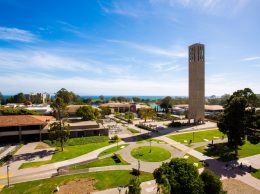
Sung Won Sohn
By Sung Won Sohn
The global financial tsunami has begun.
The United Kingdom’s vote to split from the European Union marks the first divorce in EU history, so there is no precedent to estimate the magnitude of economic pain in store for the U.K., the EU or the rest of the world.
Most likely it was an exaggeration to sway voters, but Her Majesty’s Treasury estimated that the U.K.’s real gross domestic product could fall by 3.6 percent over the next two years.
Two years is the window of time that the U.K. has to negotiate an exit from the EU, according to Article 50 of the EU.
The two-year negotiation process will likely be acrimonious with the EU making it as difficult as possible for the U.K. to exit. Anything less gives ammunition to other anti-EU factions in other countries who also might be contemplating a separation.
The negotiation could even drag on beyond the two-year window with the earliest divorce date in 2019.
Both the pound and the euro will fall, reverberating sharply throughout the world. The mounting uncertainties will hurt consumption and investments, thereby harming global economic growth.
U.K. exports could benefit from the devaluing of the pound, but apart from that, the U.K. will be the biggest economic loser. About 45 percent of U.K. exports go to the EU while just 7 percent of EU exports come into the U.K..
Similarly, 48 percent of the foreign direct investment into the U.K. comes from the EU whereas only 9 percent goes from the U.K. into the EU.
Shrinking trade and investment between the U.K. and the EU will hurt economic and job growth. Reduced immigration from the EU will reduce the labor force.
The farther away you move from the U.K.-EU epicenter, the less the economic impact. The effect on the U.S. and Asian countries will be less dramatic.
In the U.S., the immediate effect will come primarily from the gyrations in the financial markets. There will be a stronger dollar but a slower economy overseas means reduced demand from the U.K. and the EU, which will have a negative impact on the U.S. economy over the long term.
The banking system will be hard hit. In order to make sure liquidity is not a problem in the financial markets, the Bank of England and the European Central Bank will stand ready to do whatever they have to in order to avoid bottlenecks.
The Bank of England will cut the interest rate and purchase both government and corporate bonds to liquefy the financial markets.
Here in the U.S., a possible hike by the Federal Reserve this year is no longer on the table. In fact, the U.S. Central Bank may have to cut the interest rate back to zero as economic and financial conditions worsen beyond current expectations.
The geopolitical implications are numerous.
The Brexit vote shows that populism around the globe has gained momentum. It shows a rejection of free trade, globalization, immigration and multiculturalism.
Political parties wanting to leave the EU now have wings. Denmark, the Netherlands, Italy and many others in the 28-member union could contemplate abandoning their EU membership. EU disintegration would gain momentum and economic and political cooperation in Europe would be much more difficult.
In the U.S., populism on both the right and left could gain strength. The U.S. could become more isolated. The U.K. would no longer be a strong voice for the U.S. in matters related to the EU and Eastern Europe.
Scotland voted heavily in favor of remaining in the EU and Scotland’s first minister, Nicola Sturgeon, has suggested the Scottish parliament block the passage of legislation necessary for the U.K. to leave the EU. Scotland could likely have another vote for independence.
Next time around, the separatists in Scotland could very well win and the U.K. could disintegrate.
• Sung Won Sohn, Ph.D., is a professor of economics at the CSU Channel Islands Martin V. Smith School of Business and Economics.






 Print
Print Email
Email

















